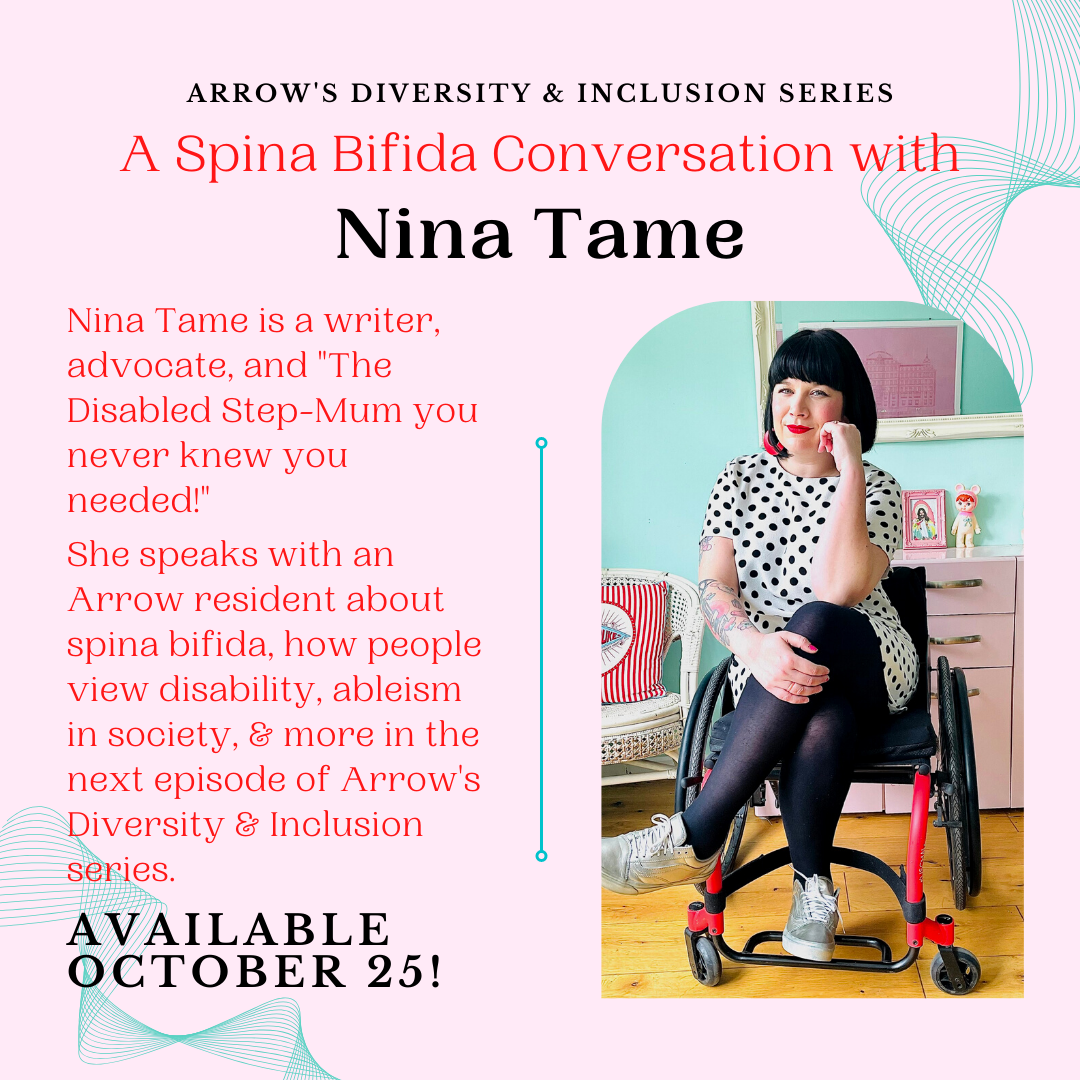
October 25, 2023
October is Spina Bifida Awareness Month, and as part of our ongoing Diversity & Inclusion Series, we invited disability advocate and writer Nina Tame to speak with Arrow resident Hazel Gumm about living with spina bifida. They discuss mobility and independence, ableism, and a happy life.
Spina bifida is a rare birth defect that occurs when the spine and spinal cord do not develop completely, and the lasting effects can vary. Some people may not know they have it, others may never be able to walk, and some are born with mobility that gradually decreases. There are surgeries that can be completed while the baby is in the womb that can prevent serious complications but can’t cure spina bifida entirely.
For Tame, her mobility has decreased over time. She had to overcome her reluctance to accept help from others and acknowledge that she physically can’t do everything herself. A change in perspective helped. She sees herself as a manager now, delegating tasks she is no longer able to do.
Still, independence is important to her, and mobility aids allow her to maintain that freedom. Tame compares mobility aids to glasses: Not too long ago, glasses were something people were embarrassed to wear. Now they are fashionable accessories. Walking aids are now becoming more colorful and fun, which helps disability seem less “grey and medical and awful,” as Tame puts it. Her wheelchair is like a shiny bike or a new car, an attitude that surprises some.
“People presume that because I’m in a wheelchair I must have a sad life,” Tame says. They assume she doesn’t have a partner or children (and are wrong on both counts). Others patronize her by saying she’s amazing and inspiring for doing something very ordinary like going shopping. Both perspectives assume that disabled people aren’t full human beings with a range of experience and capability, Tame says. Rather than making assumptions about what she can do, she much prefers the question: “What are your access needs?”
It’s a good question, because accessibility is a challenge and ties in with the larger issue of ableism, where disabled people are presumed unable or uninterested in participating fully in society. Tame describes a vicious cycle she sees in the UK where places aren’t accessible, so disabled people don’t go out, but then shops don’t make allowances for disability because “disabled people don’t come here.” But while a person’s impairments can’t be changed, things like ramps, railings, and attitudes can.
If given the access and opportunity, disabled people can live full and happy lives, and that’s something Tame wishes we saw more of in media. We rarely see disabled people and when we do, it’s often through a lens of pity or is the focal point of the character’s story (What happened to them? What caused the disability?). Tame would love to see more characters as professionals who happen to be in a wheelchair and more storylines about the social problems they face like inaccessibility and ableist attitudes. Depicting disability as a matter of fact can help change people’s perceptions and that can lead to change within accessibility and infrastructure.
Gumm herself has had to learn how to live with decreased mobility after experiencing three spinal injuries. Living with pain, she’s learned the importance of adjusting what you can do and for how long. In order to have a life you must accept and understand your body’s limitations. Her experience is a good reminder for everyone, since anyone can become disabled and mobility is not guaranteed. You have to adapt to your changing body and accept what can’t be changed.
“Walking doesn’t equal happiness. There’s a lot that goes into a happy life,” Tame says. “We’re not guaranteed anything. I try not to compare my life to anybody’s else’s because this is the life I’ve been given.”
For the full conversation, click here.
Saint Charles, Missouri-based Arrow Senior Living manages a portfolio of communities that offer varying levels of care, including independent living, assisted living, and memory care. Each and every senior living community supports residents by focusing on dignity, respect, and quality of life. The programs and amenities offered are selected to provide only the highest standard of quality and comfort.
Find an Arrow community near you
Work at Arrow Senior Living
Arrow Senior Living Management serves and employs individuals of all faiths, regardless of race, color, gender, sexual orientation, national origin, age or handicap, except as limited by state and federal law.